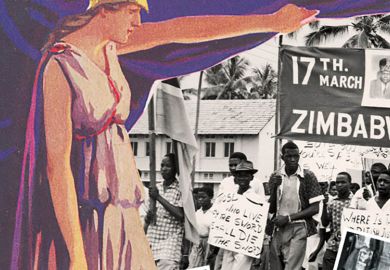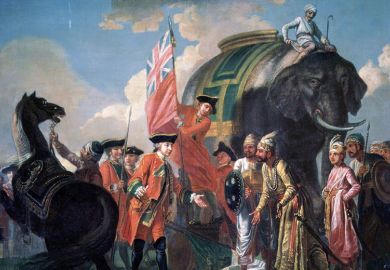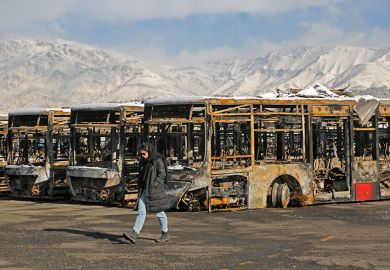So much historical research on the First World War has rightly illuminated the horrors of the conflict.
But, in a lecture which she was due to deliver this week, Margaret MacMillan, professor of history at the University of Toronto, highlighted that war has often provided funding for medical research which was otherwise unaffordable but had gone on to benefit many civilians.
“Plastic surgery got a tremendous boost in the First World War because people were scarred not just by artillery but by gas. It sounds cruel, but the nature of an all-out war means there are far more cases for doctors to learn from,” said Professor MacMillan, speaking to Times Higher Education ahead of the lecture.
This phenomenon continued into the modern era, said Professor MacMillan, former warden of St Antony’s College, Oxford. “There was much government funding for research during the Cold War,” she added.
Yet along with spurring “innovation and scientific discovery”, Professor MacMillan went on, funding from the military and related industries could pose major dilemmas for universities.
This has been seen in recent months, for example, over a threatened boycott of a Korean university amid fears that it would develop “killer robots”, or unease about military research funding in Europe.
The only solution, Professor MacMillan said, was for universities to remain true to their core values.
“There have been controversies about taking money from companies which manufactured arms. The real issue is how much independence the university and its researchers have, and what happens to the results,” she said.
“Universities get into very tricky ground when they let the donor direct the nature of the research and possess the results. That is where they really do need to be firm. They have to keep their independence, because otherwise they lose what makes them important.”
Professor MacMillan’s lecture, at the Royal Society in London, formed part of the Council for At-Risk Academics’ Science and Society series.
St Antony’s hosted a Cara fellow from Azerbaijan while Professor MacMillan was warden, from 2007 to 2017, and her college at the University of Toronto has also supported refugee academics. Meeting such people has also given her a stronger sense of the core values that universities should embrace.
“We in Western universities tend to be very comfortable,” she said. “Most of us have not experienced what it is to really stand up for your convictions and have your life threatened. It reinforces how very important free enquiry is, and how it needs to be protected.”
So what differences in promoting such values does Professor MacMillan see between the UK and Canada, where she spent most of her career before her decade in Oxford?
“At Oxford you could say almost anything as long as you were prepared to back it up,” she replied. “I found the openness of discussion very invigorating. You get a slight feeling in some North American universities that you have to tiptoe around, you have to be careful about what words you use…
“I was talking to a young researcher of literature who was visiting from outside Canada and said to her students, ‘When I get back to my own university, I’d love to teach some indigenous literature.’ There was a sort of silence and then someone said, ‘You can’t. You’re not indigenous. That would be cultural appropriation.’ And the sad thing is it means that literature is less likely to be taught.”
While Professor MacMillan strongly supports the engagement of academics in public debate, she is wary of historians “showing how virtuous we are” and doesn’t want them to shy away from addressing the complexities of politically charged topics.
“We are far enough away from the British and other European empires now,” she suggested, “that we should be able to consider them as phenomena and point out that they did some positive things. For example, the big industrial cities in India really grew under British rule…Whatever you think about capitalism, the British Empire helped to foster capitalism in India – inadvertently, no doubt.”
Given that “if you look down through history, empire is probably the most common form of government”, Professor MacMillan added, “treating empire as just something to be written off and condemned is not going to get us very far in trying to understand the past”. Furthermore, since “we are seeing the establishment of modern empires” in forms such as “Chinese creditor colonialism”, it may also hinder us from gaining insights into the present.
POSTSCRIPT:
Print headline: Free enquiry ‘needs to be protected’
Register to continue
Why register?
- Registration is free and only takes a moment
- Once registered, you can read 3 articles a month
- Sign up for our newsletter
Subscribe
Or subscribe for unlimited access to:
- Unlimited access to news, views, insights & reviews
- Digital editions
- Digital access to THE’s university and college rankings analysis
Already registered or a current subscriber?








